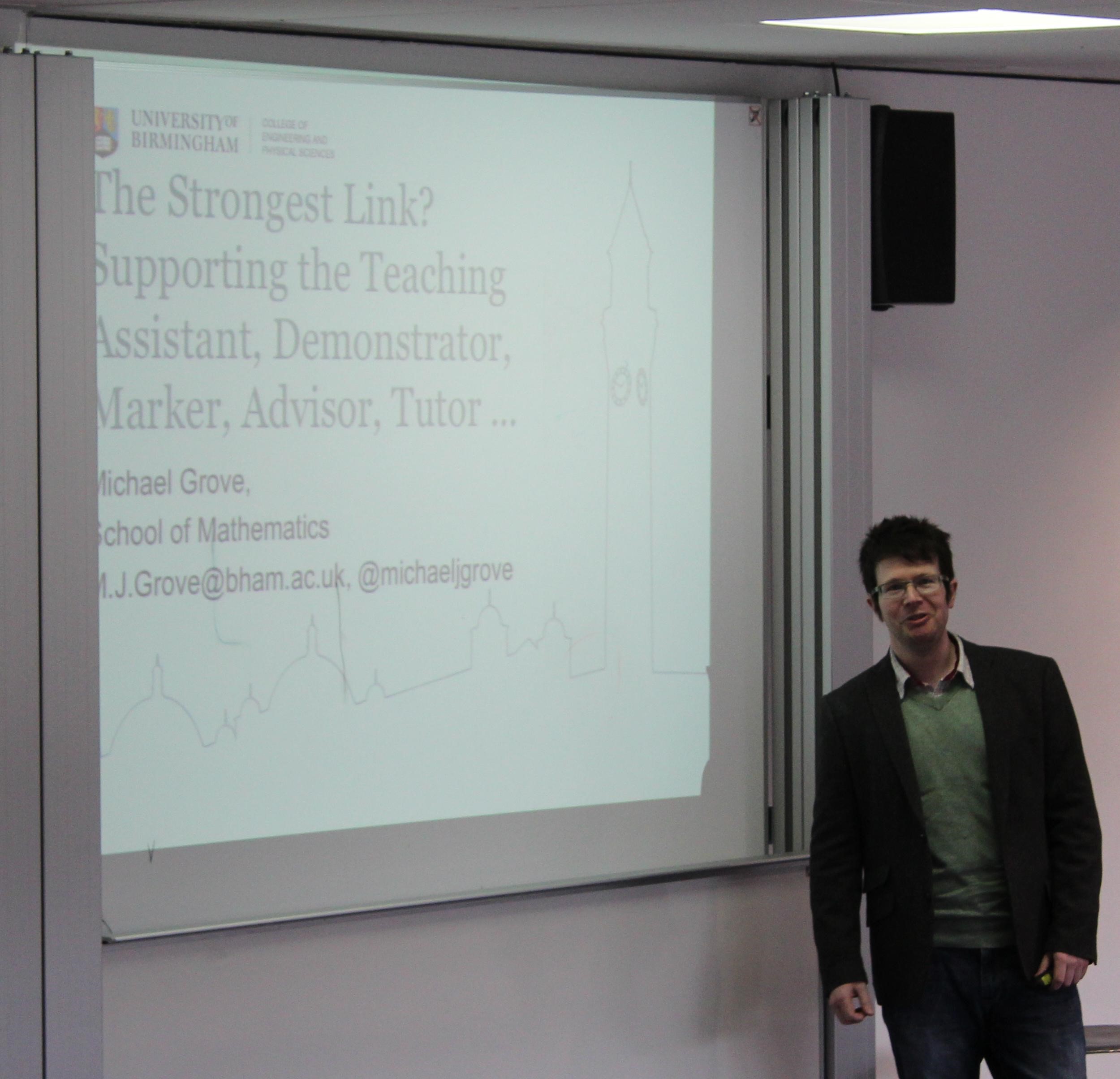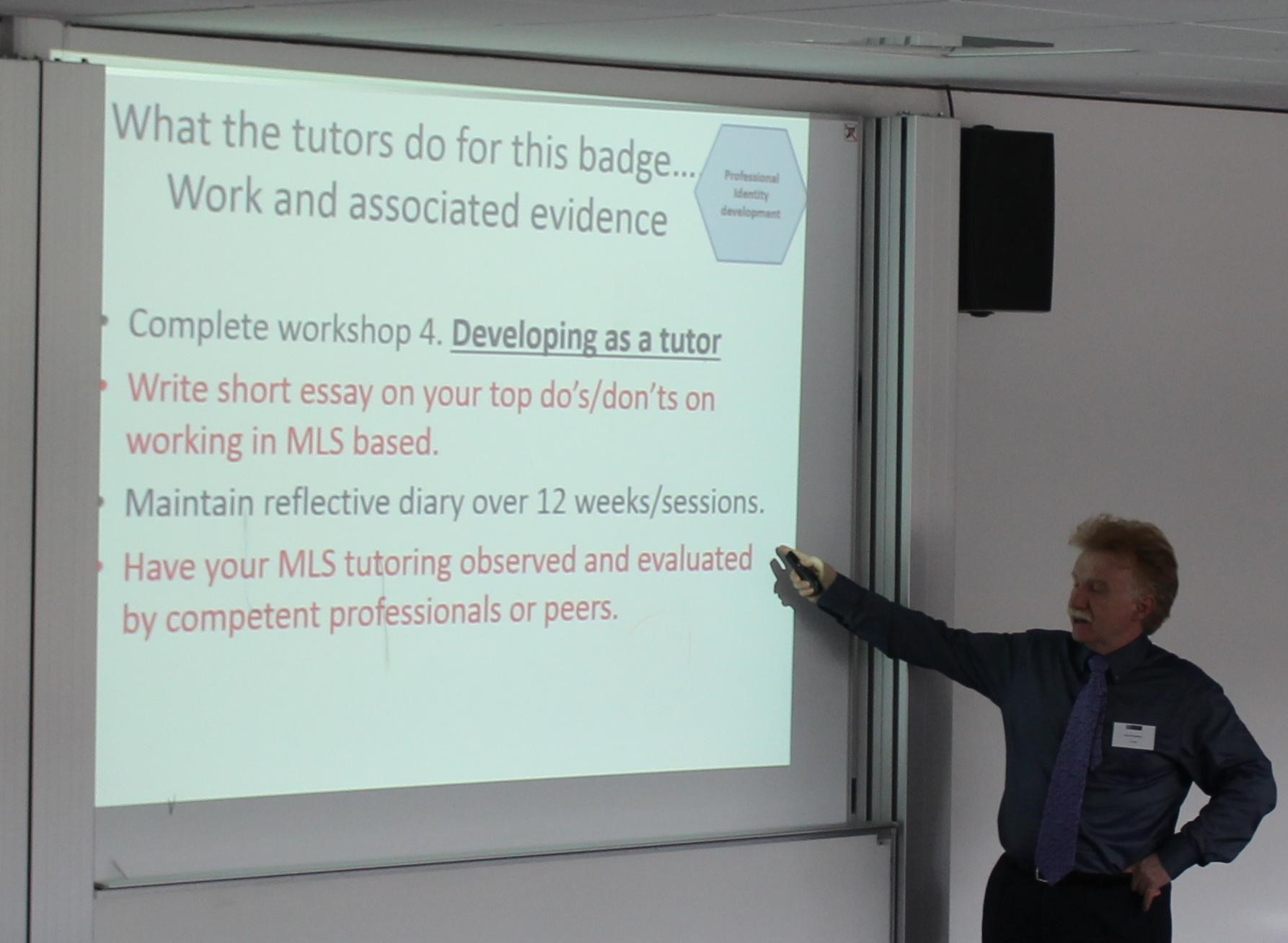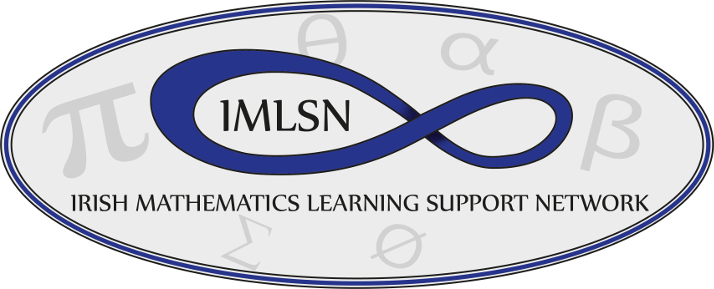Date: May 27th 2016
Location: National University of Ireland (NUI), Galway
Workshop Theme: ‘The key role of tutors of mathematics and statistics in Post-Secondary Education’
Keynote Speakers;
- Michael Grove (University of Birmingham)
- Ciarán O’Sullivan (Institute of Technology Tallaght)
Organiser:
- Kirsten Pfeiffer, NUI Galway
Workshop Report
Keynote Address:
The first keynote address was by Dr. Michael Grove (University of Birmingham).
Title: The Strongest Link? Supporting the Teaching Assistant, Demonstrator, Marker, Advisor, Tutor, …
The first keynote opened with a suggestion that many postgraduates are expected to teach or tutor without necessarily being provided with sufficient training and support training. Over the past ten years in the UK a programme of activity to support Postgraduate Teaching Assistants has been implemented, and has been expanded to encompass those working in MLSCs. In 2005 the Maths, Stats & OR Network (MSOR) introduced one-day workshops for postgraduates. On-going development and refinement of these workshops included the incorporation of a session on presenting and communicating mathematics. Several iterations of these workshops led to the development and publication of the excellent Teaching Mathematics - a guide for postgraduates and teaching assistants, authored by the speaker and Bill Cox (2012).
From 2011, it was clear that MLS was increasingly being provided by postgraduate tutors and so sigma, the network for excellence in mathematics and statistics support, developed a programme of support including materials, workshops and ‘train the trainer’ events. Subsequently, a wealth of excellent resources for good practice in maths and statistics support tutoring are now available.
Based on his comprehensive experiences, the speaker suggested useful advice on recruiting tutors, including:
- the best recommendations for postgraduate tutors can come from the postgraduates themselves,
- at training events tutors should be made aware of the ethos of the centre and their role as ambassadors for the service,
- tutors are informed of the various learning styles, abilities and specific learning differences present in a support setting as well as strategies to adopt when problem solving or for when a tutor is unable to solve a student’s problem.
The talk ended with an open question for the community to discuss: ‘having seen individuals’ progress to academic careers after working in the MLSC, are these two linked, and is this of further interest and worthy of study?’

Dr. Michael Grove
Keynote Address:
The second keynote address was by Ciarán O’Sullivan (Institute of Technology Tallaght).
Title: Staff development in Mathematics Learning Support in Ireland: where are we now and where to next?’
This keynote presentation started with a thorough overview of tutor training and MLS to-date. It referred to the excellent work carried out in the UK by sigma and others, for example the guide from Croft et al. (2011) and the work of Michael Grove, Joe Kyle and others in terms of tutor training sessions. In 2013, IMLSN Committee members Páraic Treacy, Ciarán Mac an Bhaird and Ciarán O’Sullivan, developed a series of four tutor training workshops based largely on the sigma materials. These were trialled at different institutions, and this project led to the establishment of an IMLSN Special Interest Group (SIG) ‘Building Tutor capacity: Supporting tutors in MLSCs through an interactive training environment’. Further details about this SIGs work is available from Fitzmaurice et al. (2016).
The speaker then drew participants’ attention to the National Forum for the Enhancement of Teaching and Learning (NFTL) and their work on a framework for the professional development of those who teach in Higher Education. He focussed on the significant benefits for tutors/staff involved in mathematics and MLS teaching and then put forward an in-depth proposal on four different badges/courses that could be taken as part of CPD. The four areas he identified are listed below with a brief indication of why he believed they were necessary
- Professional Knowledge and Skills for MLS tutors: This is needed to inform tutors of the fundamentals of their role while working in MLS and in particular to equip them with the best techniques for maximising the mathematical learning of students in the one to one scenarios and small group tutoring that occur in MLS. Also this badge is needed to educate tutors on how best to meet the learning requirements of additional needs students in MLS environments.
- Professional Communication and Dialogue for MLS tutors: This is needed to develop the listening/questioning skills that are at the centre of student/tutor interaction in MLS. Also there is a need to develop academic ‘critical’ reading/writing skills so that MLS tutors can explore and learn from MLS literature. Also this badge is needed to give the tutor the skills and opportunity to participate in and contribute to MLS relevant study groups or communities of MLS tutor (online or otherwise).
- Professional Identity, Values and Development for MLS tutors: This is needed to enable tutors to explore the understanding of their own learning in an MLS context, to develop reflective practice skills and to learn how to engage in evaluation of their MLS practice by peers.
- Professional and Personal Digital Capacity of MLS tutors: This is needed to equip tutors with the knowledge of data protection and ownership/intellectual property issues relevant to their role in MLS. This badge is also needed to develop tutors’ confidence and competence with digital tools in an MLS context so that tutors can help students use relevant materials and also so that tutors can develop the skills to create digital learning materials that enhance MLS.
The speaker went through these 4 badges in detail, identifying the areas where existing suitable resources were available, and the areas where resources needed to be developed. NFTL also fund All Aboard (Digital Skills in Higher Education). Part of this project involves piloting and digital badges, and the speaker described provisional discussions with them to explore a collaboration between the IMLSN and the All Aboard project which would enable the four MLS badges to be supported from a technological point of view. The presentation closed with participants giving written feedback on each of the badges. The speaker will collate these and present the outcomes at the next meeting of the IMLSN committee so a decision can be made on how best to proceed.

Ciarán O’Sullivan
Contributed Talks:
The first contributed talk was by Niall McInerney and Kevin Brosnan (University of Limerick).
Title: Challenges for tertiary level mathematics tutors with no formal education training: The experience of two practitioners.
In this presentation, two PhD students focussed on their experience of two different types of tutorials run in the University of Limerick. Formal Tutorials (FTs) run by the Department of Mathematics and Support Tutorials (STs) offered by the MLSC. FTs have 40-50 students from a module assigned to each one, and tutors present solutions to assignments. Tutors are often required to deliver these tutorials and are not paid. STs are announced by the MLSC for each course, they start with 15-20 students, students are responsible for the material content and tutors are paid.
The speakers described how, in their experience, FTs had poor student engagement and the tutors basically just transcribed the answers. Tutors can also lack motivation because of this structure and the fact that they are not being paid. STs do not have the constraint of a problem sheet, and, at the start of the year, there is very high engagement between tutors and students. Due to their success, the numbers attending increase significantly, but as a consequence, their effectiveness decreases. In one course, only 60-70 of 300 students were attending lectures regularly but 150 were attending STs. The large class sizes often discourage the weaker student (who the ST is aimed at) from participating whether it be asking questions or engaging in discussions, and also inhibit the tutor to roam the classroom for personalised help.
The speakers discussed the role and position of MLS and STs in the student learning experience. They argued that MLS is not a replacement for traditional classes; that FTs would be much more effective if structured like STs, with smaller numbers and more interaction. This means moving away from the scribing of tutorial sheet solutions towards a more collaborative problem-solving environment, where the students attempt the traditional FT work outside of class.
The second contributed talk was by Prof.Ted Hurley (NUI Galway).
Title: Make it (Mathematics) stick.
This broad ranging and entertaining presentation carried a number of important messages with regards to mathematics education. The speaker’s main focus was on the negative perception of the teaching and learning of mathematics, and the attempts made to address the so-called 'issues'. He discussed his experience as a mathematics educator, both as researcher and as teacher. He also discussed his considerable interactions with the general public in relation to mathematics, and in particular his media contributions.
An emphasis was placed on various ‘reforms’ which have been carried out in mathematics, e.g. in curricula, and in teaching and learning practices, for example the syllabus reform ‘Project Maths’ which has been introduced in Ireland gradually since 2008. The speaker stated that these reforms often cause more harm than good, they can ignore existing good practice and often seem to be carried out just for the sake of change.
The speaker also discussed a number of texts in the context of teaching and learning mathematics. For example, he discussed the book ‘Make It Stick’ (Brown et al., 2014) and advocated that it should be a required study for all teacher/tutor training courses. He emphasized the benefits of the techniques of learning as described in this book, which are not specifically related to mathematics, but can easily be adapted for learning and teaching mathematics.
The third contributed talk was by Richard Walsh (University of Limerick).
Title: An analysis of pedagogy of mathematics support tutors.
This talk described a project, run by the speaker and Olivia Fitzmaurice, which focussed on the training of tutors providing MLS. It started with a brief description of MLS provision at the University of Limerick, and recognised the key role of MLS tutors. They stressed the importance that students attending MLS have a tutor who can transform their own mathematics content knowledge into a form that students can understand and benefit from.
The project involved three MLS tutors who did not have backgrounds in mathematics education and they developed a framework which used Rowland’s Knowledge Quartet and General Pedagogical Knowledge. The tutors were videoed when they were providing MLS, and then the presenter analysed the videos using the developed framework and gave feedback to the tutors after the tutors had also watched the videos of their own tutoring. A finding that was presented was that tutors lacked general pedagogical skills (e.g. unorganised blackboard work, spoke too quickly). Tutors also did not allow students to try any problems and classes were far too didactic to achieve any real learning from the students. A full paper on this project has been accepted for publication in the International Journal of Mathematical Education in Science and Technology and will be published in the near future.
The fourth contributed talk was by Cesar Scrochi (University College Dublin).
Title: Tutoring in a Maths Support Centre as an enrichment experience for tutoring large groups.
This speaker outlined how his large (30+ students) class tutoring has improved as a result of tutoring one-on-one or small groups in a MLS setting. His framework was based on the theory of Pedagogical Content Knowledge proposed by Lee Shulman (1986) and in particular on the six subdomains of Mathematical Knowledge for Teaching proposed by Deborah Ball et al (2008). Through the use of examples on limits and continuity, the speaker highlighted how four of these six subdomains have improved his tutoring since joining as a tutor in the UCD MLSC a year ago. The subdomains covered during this presentation were: Common Content Knowledge (CCK), Specialized Content Knowledge (SCK), Knowledge of Content and Teaching (KCT), and Knowledge of Content and Students (KCS).
Through the use of students’ misconceptions, multiple representations and examples the speaker showed that successful teachers need not only know the subject matter that they teach (CCK), but they should also know different ways that a student might approach a problem (SCK), predict the students’ approach to a topic so they know what they might be (incorrectly) thinking (KCS) and combine the knowledge of mathematics and learning (KCT), in order to improve students’ learning.
One of the examples presented focused on how important it is for tutors to identify the real source of students’ mathematical errors when tutoring in a MLSC (SCK). A student might come in asking for help with finding the value of a limit only to realize that what he/she is really struggling with is factorizing polynomials. Insights like this on students’ difficulties have helped the tutor improve his tutoring practice (KCS).
The fifth contributed talk was by Maura Clancy (Limerick Institute of Technology).
Title: Audit of mathematics learning support in Ireland in 2015 – the key findings.
This speaker presented an overview of the results from a recent IMLSN survey of 32 Higher and Further Education Institutions on the island of Ireland which received a 97% response rate. Responses included universities (32%), Institutes of Technology (39%), Further and Higher Education Institutes (13%) and Colleges of Education and Liberal Arts (16%) making it one of the more comprehensive nationwide surveys of its type. MLS is offered in 84% of institutions with 65% of those providing MLS through a dedicated centre. The speaker reported on developments of MLS in Ireland since the last audit of 2008 (Gill et al.). In that time the percentage of institutions offering MLS through a MLSC has risen from 38% to 65%. However, the percentage of permanent MLSCs only increased by 5%. It is interesting to note that funding for MLS from a variety of sources within an institution has risen from 54% to 92%, suggesting the recognised value of MLS across the entire institution. MLS tutors are increasingly sourced from postgraduates with the percentage of institutions using postgraduates rising from 38% to 56%. The survey highlights the extra staffing difficulties encountered by those institutions that do not have a constant and appropriate supply of such students. The survey reports on an extensive range of responses under the six themes of (i) Availability and practical operation of MLS, (ii) Staffing and tutors, (iii) Types of support available, (iv) Users of the service, (v) Reporting and evaluation of MLS activities and (vi) Challenges and developments and will be published in the autumn of 2016 and available here.
Of particular relevance to the theme of this conference was the fact that only 52% of institutions providing MLS offer a training programme to their tutors. When asked how their MLS could be improved, 54% of respondents referred to tutoring staff in various ways, namely, more tutors, permanent tutoring staff and tutor training. A common refrain among respondents was that tutors should be given longer term contracts and better salaries and that postgraduate tutors should be better supported through terms and conditions that encourage professional development and retention.
The sixth contributed talk was by Julie Crowley (Cork Institute of Technology).
Title: Online e-assessment tool Numbas as a tutorial tool.
The speaker, along with colleagues in Cork Institute of Technology (CIT) and University College Cork (UCC), received funding from the NFTL in 2014 for the project Transitioning to e-assessment in Mathematics Education. The presenter had originally been teaching a ‘bridging course’ in mathematics, and providing appropriate assessment was taking up a lot of valuable time. She attended a presentation on the online e-assessment tool Numbas at one of the CETL-MSOR conferences and immediately recognised its potential. This led to the application to the NFTL.
In CIT, was trialled as a tool in tutorials, students used it in class and then used it for assessment towards the end of the semester. Students and instructors both found it easy to use, and the speaker mentioned the benefits of being able to add hints, comments and extra resources. She further reported on an increase in attendance and engagement when compared with traditional tutorials, though it was noted that Numbas tutorials had assessments. Instructors observed that students in Numbas tutorials were more eager to ask questions if they were stuck, they liked the instant feedback. Instructors also stated that the automatic correction of assessments was of great benefit to reducing their workload. In UCC, the trial attempted to run the assessment from home, but students reported some technical difficulties. In order to address this, next year tutorials will be run at the start of the semester on how to use Numbas.
Finally, the speaker advised that workshops on how to use Numbas can be arranged with people from the project team before the end of 2016.

